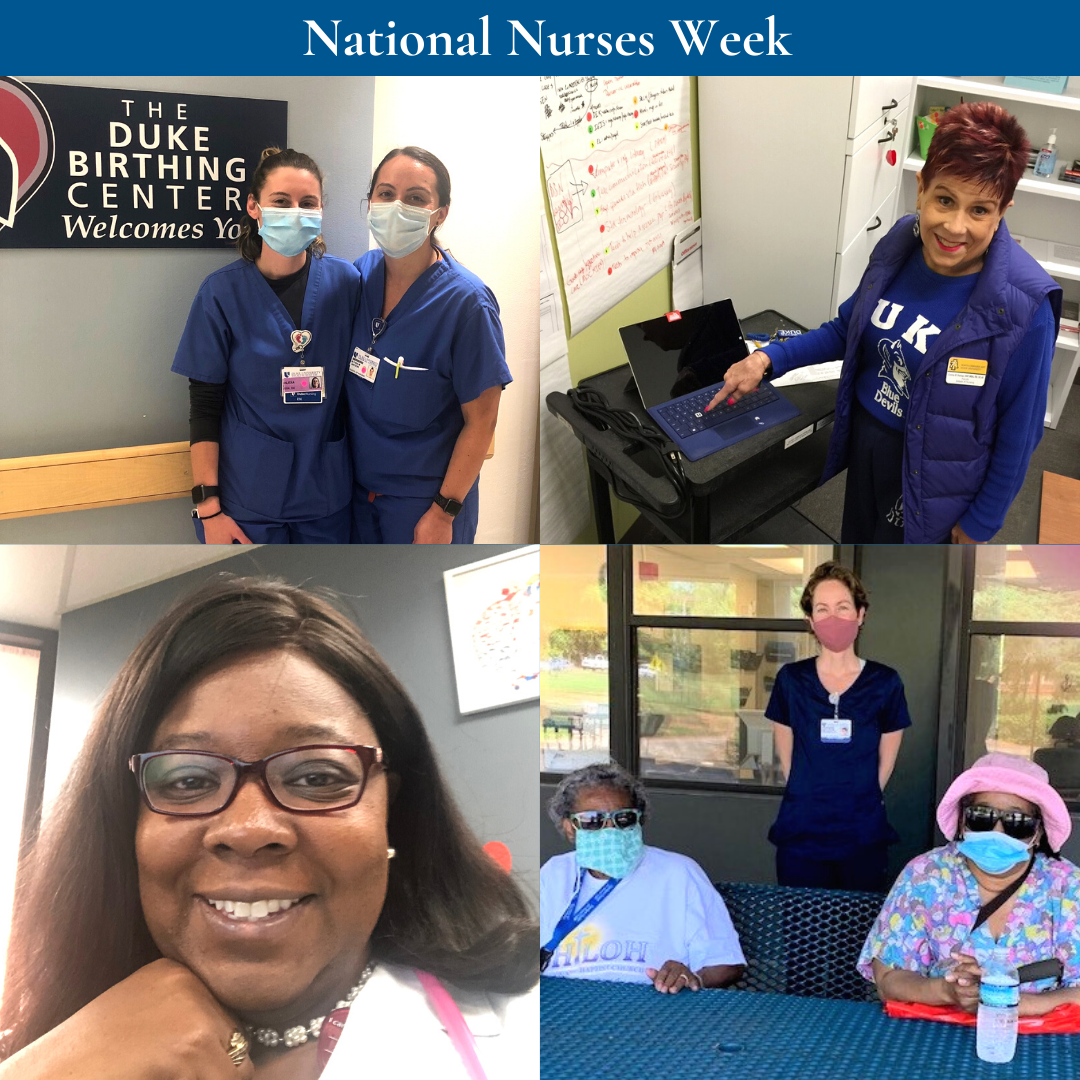How the Pandemic Has Affected the Public’s Perception of Nursing
In honor of National Nurses Week and the continuation of the Year of the Nurse, here our some thoughts on how the public perception of nurses have changed over the last 14 months.

Throughout the pandemic, nurses have stepped into the forefront of the public eye and have been hailed for their continuous, courageous work on the front lines.
In honor of National Nurses Week and the continuation of the Year of the Nurse, we asked a few MSN students their thoughts on how the public perception of nurses has changed over the last 14 months.
Claire Draudt
“I am an RN working at Harborview Medical Center, University of Washington, in Seattle. I started here a month before COVID came to our state. 2020 was scary, exhausting, overwhelming, and at the same time, I do not think I've ever felt more appreciated as a nurse. It used to be that when I said I was a nurse, the conversation would change, but now, it's ‘Wow, thank you for all that you've endured,’ and ‘You guys are the real heroes.’ I know that time will pass, and people’s minds will become focused on the next big thing (likely, climate change-related). But it feels wonderful to be recognized for the brave work my colleagues and I have done this past year.”
Whitney Thornton
 “A nurse’s job has always been invaluable and yet dangerous. Over the past 14 months, the public has been able to gain a small amount of insight into our world. It’s a rarity now to hear, ‘They just sit at the nurses station all day,’ or ‘They’re just playing cards.’ Phrases like that are now taboo and have always been demeaning to our profession. Some may disagree that 2020 was the “Year of the Nurse” that Florence Nightingale predicted a century ago. However, I could not agree more with the founder of modern nursing. The past year has provided nurses with a voice like never before, to not only continue advocating for our patients but to advocate for ourselves, united and on one accord. Our profession has been tested and continues to be the most trusted profession in the world. Our patients and their families, these past months, entrusted us to not only care for them but to hold the hand of their sick and their dying when they were unable. The nurses’ touch became the guiding light of hope, strength and compassion that connected families during an unparalleled time. They say that diamonds are formed under intense pressure, and, much like a diamond in the rough, nurses came out strong and beautiful under the intense pressure of the pandemic and nationwide civil unrest. Only time will tell if the public will forget the sacrifices and losses nurses took in the face of the unimaginable. We can rest in knowing that our patients will never forget how we treated them, and, for that very reason, nursing will continue into the future.”
“A nurse’s job has always been invaluable and yet dangerous. Over the past 14 months, the public has been able to gain a small amount of insight into our world. It’s a rarity now to hear, ‘They just sit at the nurses station all day,’ or ‘They’re just playing cards.’ Phrases like that are now taboo and have always been demeaning to our profession. Some may disagree that 2020 was the “Year of the Nurse” that Florence Nightingale predicted a century ago. However, I could not agree more with the founder of modern nursing. The past year has provided nurses with a voice like never before, to not only continue advocating for our patients but to advocate for ourselves, united and on one accord. Our profession has been tested and continues to be the most trusted profession in the world. Our patients and their families, these past months, entrusted us to not only care for them but to hold the hand of their sick and their dying when they were unable. The nurses’ touch became the guiding light of hope, strength and compassion that connected families during an unparalleled time. They say that diamonds are formed under intense pressure, and, much like a diamond in the rough, nurses came out strong and beautiful under the intense pressure of the pandemic and nationwide civil unrest. Only time will tell if the public will forget the sacrifices and losses nurses took in the face of the unimaginable. We can rest in knowing that our patients will never forget how we treated them, and, for that very reason, nursing will continue into the future.”
Liya B. Lakew, MSN student
“The public perception of nursing and the nursing profession in television and other forms of media have been highlighted by the point of view of nurses as sympathetic caretakers as well as brainless sex objects. Media shapes human opinion whether we like or not, so media presentation of nurses has to be taken into account when nurses and members of other professions work with patients who are exposed to these perspectives. However, as many of us know, media presentations are not always reality-based or fully reality-based. This lack of reality forms a ‘bone of contention’ between nurses and the general public.
From a historical perspective, the perspectives of nurses have changed over the years. The work of Florence Nightingale on issues of cleanliness and sterilization in hospitals created the image of a symbol of excellence for the profession which evolved into nurses being depicted as ‘heroes’ during World War II, supporting fighting men on recruitment posters. Nursing was considered an admirable profession for women with nurses perceived as compassionate and caring. This view of nurses and nursing was diminished due to media presentations.
The phenomena of the COVID-19 pandemic over the past 14 months provides an opportunity to reexamine the public perceptions of nursing in order to determine whether or not these perceptions have been altered. For starters, although nurses are members of what has been called 'health care workers' or 'first line workers,' this designation does not convey nurses as distinct professionals with distinct knowledge and function. Therefore, exploration on this issue is needed to make a realistically based assessment on whether or not the public perceptions on nurses have changed.
Fast forwarding to 2019 and beyond, it is my opinion that the public perceptions of nurses have changed a little as this emergency allowed patients and their families to witness the work that nurses do more intensely. Nurses, after all, make front line decisions and take front line actions in all aspects of patient care. Once again, the media is involved in influencing the public perception of nurses, however, this time in a positive way. Media reports captured nurses caring for patients in a variety of settings, from acute and highly technical environments such as intensive care unit to older residents in nursing homes. The public was able to experience firsthand the reality of nursing and how crucial nurses are. This previously and often unseen view from inside hospitals and caring facilities was a refreshing insight that positioned nursing as central to the care of patients.
Looking back a year ago, how our government officials failed to provide us with needed supplies such as masks and gowns for nurses and other health care workers is a clear indication of the lack of respect for nurses and the nursing profession. In addition, based on research I gathered, (the notion of whether or not) nurses and nursing as separate entities and whether or not the public perceptions have changed is limited. For example, based on an interview with Rachel (Rae) Woods from a Radio Advisory podcast and Christopher Kerns, vice president of Executive Insights at Advisory Board who discuss the health care industry, ‘The same is true with clinicians; 68% of those polled said they had a more positive view of providers because of how they've reacted to COVID-19’. There is nothing in the interview on nurses specifically. However, based on the information available, in the United States, I would say that a change in public perception of nurses to a more positive, realistic point of view is possible. However, nurses provide care because this is a calling and a duty, and we have learned how to navigate around negative stereotyping and still provide excellent service. While it would be nice if nurses were appreciated more, nurses do what they do because we know that what we do is needed whether it is appreciated or not."